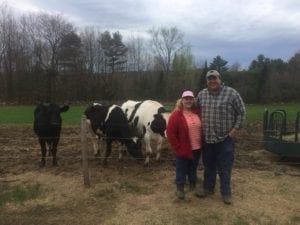
Cathy & Dennis Knudsen, owners of Ambrose Farm in Turner, land which is protected with an agricultural easement held by ALT.
Androscoggin Land Trust works to protect land by engaging in voluntary, cooperative, and confidential relationships with individual landowners to develop the most appropriate conservation method for their property.
Deciding to conserve your land requires careful, thorough consideration of your family’s interests for the future of the property. Our professional land protection program and your own legal and financial counsel can help you decide which is the appropriate option for you, but the heart of the process is really your hope to permanently protect the scenic beauty, wildlife habitats, and valuable natural resources of your land.
Donating a Conservation Easement
A conservation easement is a type of deed that keeps land in private ownership with specific covenants that describe how the land can be used. The easement is donated to the Land Trust, which accepts the responsibility of assuring that the conservation values of the property are permanently conserved. Easements are customized for each property. For example, some easements keep all or part of the property “forever wild”, while others allow forest management or agriculture.
Donation of a conservation easement can result in significant tax benefits for the landowner if appraisal of the conservation easement establishes that the value of the property has been reduced by the restrictions of the easement. Also, if the landowner places the easement land in Maine’s Farm and Open Space tax classification, the property taxes can be reduced.
Donating Land
Our Preserves are properties to which the Land Trust owns full title. Many preserves were donated to us by generous landowners who wished to leave a legacy for future generations by conserving their property while providing the community an opportunity to appreciate its natural and scenic values. When a landowner offers to donate land to the Land Trust, we evaluate it thoroughly to determine that it has substantial conservation value and public benefits that merit the effort and expense of our permanent stewardship. Once land is accepted for conservation as a preserve, we are committed to protecting it perpetually.
A donation of land is usually the simplest method to conserve its resources, and provides the maximum income and estate tax benefits, which are established by a simple appraisal process.
Purchasing Land
Because real estate is quite expensive and we must raise funds for land purchases, purchasing land is not our general practice. However, in some instances, the Land Trust will purchase properties with exceptional conservation values. When we purchase land, we negotiate on a voluntary basis with the landowner for either a “fair market” price or a “bargain sale” price.
A fair market price is what the land would bring if it was sold on the open real estate market, as established by an appraisal of the property by an independent real estate appraiser. Some landowners can benefit from a bargain sale of their property-that is, a sale for below the appraised value. The difference between the appraised value and the purchase price is considered a charitable gift. A bargain sale is a demonstration of the landowner’s generosity and commitment to conserving their property, with mutual financial benefits for both landowner and Land Trust.
Donating a Reserved Life Estate
By donating a reserved life estate, you can donate ownership of your land to the Land Trust today, but reserve the right to use the property during your lifetime, or the lifetime of designated family members. In this way, you can be assured that your property is permanently conserved but still use the property as you have – farming the fields, managing the forest, or managing public access. In addition to maintaining use of the property, by donating a reserved life estate, you can also realize the tax benefits of the donation today.
For tax purposes, determining the value of the donation begins by getting an appraisal of the property’s fair market value. Next, the Internal Revenue Service’s actuarial tables are used to determine the life expectancy of the donor and any designated family members. Then, the value of using the land each year of the life expectancy is estimated. This value is subtracted from the original value of the land, and the remainder is considered a tax-deductible donation.
Realizing Your Land Conservation Options
If you are interested in discussing options for conserving your property, we would be very pleased to meet with you. Please call us at (207-782-2302), or via e-mail at info@androscogginlandtrust.org. We can arrange a time to meet, talk through your interests, and determine how we can best work with you to conserve the important scenic and natural resources of your land.
